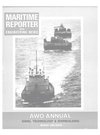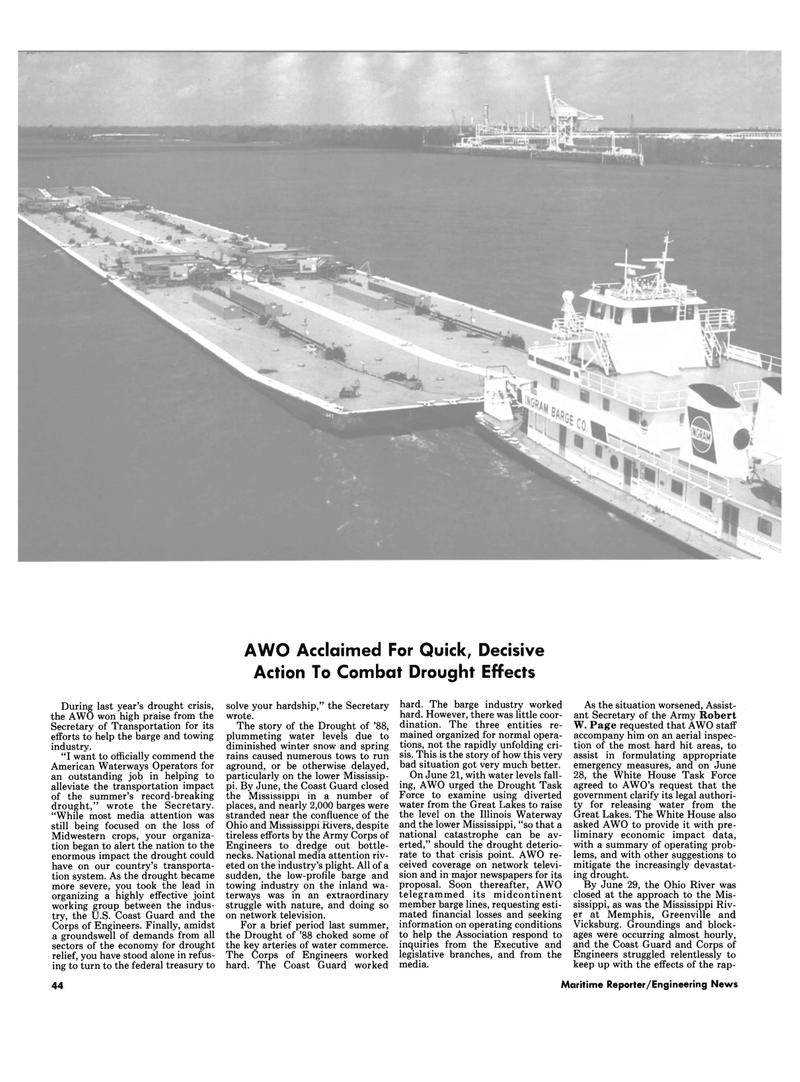
Page 44: of Maritime Reporter Magazine (March 1989)
Read this page in Pdf, Flash or Html5 edition of March 1989 Maritime Reporter Magazine
AWO Acclaimed For Quick, Decisive
Action To Combat Drought Effects
During last year's drought crisis, the AWO won high praise from the
Secretary of Transportation for its efforts to help the barge and towing industry. "I want to officially commend the
American Waterways Operators for an outstanding job in helping to alleviate the transportation impact of the summer's record-breaking drought," wrote the Secretary. "While most media attention was still being focused on the loss of
Midwestern crops, your organiza- tion began to alert the nation to the enormous impact the drought could have on our country's transporta- tion system. As the drought became more severe, you took the lead in organizing a highly effective joint working group between the indus- try, the U.S. Coast Guard and the
Corps of Engineers. Finally, amidst a groundswell of demands from all sectors of the economy for drought relief, you have stood alone in refus- ing to turn to the federal treasury to 44 solve your hardship," the Secretary wrote.
The story of the Drought of '88, plummeting water levels due to diminished winter snow and spring rains caused numerous tows to run aground, or be otherwise delayed, particularly on the lower Mississip- pi. By June, the Coast Guard closed the Mississippi in a number of places, and nearly 2,000 barges were stranded near the confluence of the
Ohio and Mississippi Rivers, despite tireless efforts by the Army Corps of
Engineers to dredge out bottle- necks. National media attention riv- eted on the industry's plight. All of a sudden, the low-profile barge and towing industry on the inland wa- terways was in an extraordinary struggle with nature, and doing so on network television.
For a brief period last summer, the Drought of '88 choked some of the key arteries of water commerce.
The Corps of Engineers worked hard. The Coast Guard worked hard. The barge industry worked hard. However, there was little coor- dination. The three entities re- mained organized for normal opera- tions, not the rapidly unfolding cri- sis. This is the story of how this very bad situation got very much better.
On June 21, with water levels fall- ing, AWO urged the Drought Task
Force to examine using diverted water from the Great Lakes to raise the level on the Illinois Waterway and the lower Mississippi, "so that a national catastrophe can be av- erted," should the drought deterio- rate to that crisis point. AWO re- ceived coverage on network televi- sion and in major newspapers for its proposal. Soon thereafter, AWO telegrammed its midcontinent member barge lines, requesting esti- mated financial losses and seeking information on operating conditions to help the Association respond to inquiries from the Executive and legislative branches, and from the media.
As the situation worsened, Assist- ant Secretary of the Army Robert
W. Page requested that AWO staff accompany him on an aerial inspec- tion of the most hard hit areas, to assist in formulating appropriate emergency measures, and on June 28, the White House Task Force agreed to AWO's request that the government clarify its legal authori- ty for releasing water from the
Great Lakes. The White House also asked AWO to provide it with pre- liminary economic impact data, with a summary of operating prob- lems, and with other suggestions to mitigate the increasingly devastat- ing drought.
By June 29, the Ohio River was closed at the approach to the Mis- sissippi, as was the Mississippi Riv- er at Memphis, Greenville and
Vicksburg. Groundings and block- ages were occurring almost hourly, and the Coast Guard and Corps of
Engineers struggled relentlessly to keep up with the effects of the rap-
Maritime Reporter/Engineering News

 43
43

 45
45
